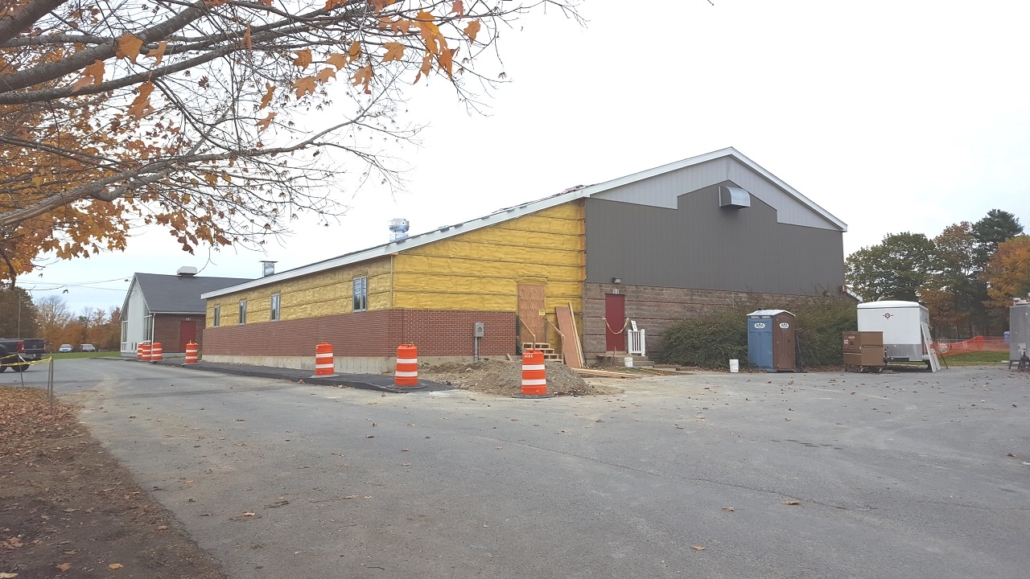CHINA: Firefighters’ stipend argument continues; LaVerdiere walks out, resigns
/0 Comments/in China, News/by Mary Grow by Mary Grow
by Mary Grow
The argument over volunteer firefighters’ stipends that China selectmen have conducted intermittently for a year and a half continued at their Oct. 15 meeting, culminating with Selectman Jeffrey LaVerdiere announcing he was tired of arguing, resigning from the board and walking out.
As of Oct. 22, Town Clerk Becky Hapgood, who attended the meeting in the temporary absence of Town Manager Dennis Heath, was unable to reach LaVerdiere to find out whether he intends to confirm his resignation in writing.
At the March 2018 town meeting, voters approved $40,000 to be distributed equally among China Rescue and the three volunteer fire departments and used as stipends to help encourage new members to join emergency services groups. Selectmen and firefighters were to sign a memorandum of agreement setting forth rules for sharing the money among volunteers.
A draft memorandum has been repeatedly discussed. Heath sought reactions from the state labor department, and after approval there from the federal labor department. Hapgood said despite weekly telephone calls the manager has been unable to get a federal opinion.
At the Oct. 15 meeting, selectmen had a warrant – a request to pay – for the $40,000. Selectman Ronald Breton said fire department representatives have not signed the memorandum and the $40,000 should not be handed over until they do.
LaVerdiere said other towns’ officials told him they did not think any memorandum was needed. He argued the selectmen should show their trust in the firefighters by signing the check without further delay.
Board Chairman Robert MacFarland said the issue is not trust, but bookkeeping: municipal officials should have a signed contract with any private entity, including a fire department or rescue service, that performs services for the town.
Breton said he was not ready to vote on expending the funds until federal labor officials approved. At that point LaVerdiere left and the remaining board members tabled the question.
The next evening they held a brief special meeting where, Hapgood reported, they signed the warrant approving payment of the $40,000 when fire department representatives sign the memorandum.
The Oct. 15 meeting was preceded by two public hearings, one on the Nov. 5 local ballot questions and one on proposed amendments to appendices to the General Assistance Ordinance. Three residents attended. Neil Farrington asked general questions about the ballot questions and no one commented on the General Assistance Ordinance.
Selectmen told Farrington the five questions asking if residents want to allow medical marijuana operations in town will have no effect on Nathan White’s Route 3 business, which opened before the Dec. 2018 deadline for “grandfathering.”
The final ballot question asks voters to choose between two extra-hours proposals for the town office (the current Saturday morning, or Thursday evening until 7:00). A note says the question is advisory only, but MacFarland assured the audience the Selectboard will abide by the popular will.
During the meeting, selectmen approved the General Assistance Ordinance changes, which adjust maximum amounts allowed for assistance categories.
TIF (Tax Increment Financing) Committee member Tom Michaud reported on work to improve three fire roads that is partly funded by TIF money. He invited other China residents who believe their fire roads need work to reduce run-off to contact him, Peter Caldwell or Bill Powell.
Michaud established that when he (or any other resident) is out of town and wants to comment at a selectmen’s meeting, he should look at the agenda, posted on the website a few days before the meeting, and email or otherwise send comments to which board members can respond.
Selectmen unanimously appointed Edward Brownell a member of the recreation committee.
They unanimously set fees for after-the-act permits issued by the codes officer or planning board at twice the amount the fee would have been if the application had been filed before the work started.
The next regular China selectmen’s meeting is scheduled for 6:30 p.m. Monday, Oct. 28.
CHINA: Two-sided local ballot for November 5
/0 Comments/in China, News/by Mary Grow by Mary Grow
by Mary Grow
China voters have a two-sided local ballot to fill out Nov. 5: local elections on one side, local referendum questions on the other.
The first four referenda are intended to comply with state law requiring municipalities to “opt in” before anyone may open a new medical marijuana facility. The questions ask if China voters want to allow “medical marijuana registered caregiver retail stores,” “medical marijuana registered dispensaries,” “medical marijuana testing facilities” or “medical marijuana manufacturing facilities.” Definitions of the terms are in state law, Title 22, Chapter 558-C.
The fifth question asks if voters want to require a minimum 1,000-foot distance between the property line of any of the above, if approved, and a pre-existing public or private school.
The final question asks voters to choose between two possible three-hour extensions of town office hours: staying open until 7 p.m. Thursdays, or continuing to open from 8 to 11 a.m. Saturdays. A note says the question is advisory only and selectmen are not bound to implement either schedule.
There is a single contest on the election side of the ballot. Two selectmen’s terms are expiring, Irene Belanger’s and Robert MacFarland’s, and three residents have returned nomination papers, Belanger, Wayne Chadwick and Todd Tolhurst.
Ranked choice voting is not used in China’s 2019 local elections.
There are no listed candidates for three planning board seats, District 1 (Kevin Michaud’s term ends), District 3 (Ralph Howe’s term ends) and the alternate position elected from anywhere in town (currently vacant).
For the budget committee, Chairman Robert Batteese and District 1 representative Kevin Maroon are unopposed for reelection. There is no name on the ballot for the District 3 seat that Chadwick currently holds.
China polls will be open from 7 a.m. to 8 p.m. Tuesday, Nov. 5, in the portable building behind the town office. Residents may vote in advance, at the town office or elsewhere, until Oct. 31. After that date, state law says absentee ballots may be issued only if the voter is unexpectedly out of town the entire time the polls are open, has a physical disability or is confined to home or a “treatment facility” due to “incapacity or illness.”
China candidates critical of current administration’s procedures and decisions
/0 Comments/in China, News/by Mary GrowProgress on China Middle School expansion (October update)
/0 Comments/in China, News/by Website Editor
Construction continues on the addition to the China Middle School as masons have begun to apply the brick work on the outside of the building. Work remains on schedule. The $1.5 million project will add storage for cafeteria tables, redoing the gym floor and upgrading the HVAC system, along with repairing the roof and other fire code improvements to meet compliance of new laws. (Photo by Roland D. Hallee)
Seeking donations for classroom
/0 Comments/in China, Community/by Website Editor Megan Marquis, a high school math teacher, has moved back to Maine and is seeking donations for chairs and tables so students have some place to sit in the classroom. If anyone has tables (farmer’s market style, wooden) or any amount of rust-free metal folding chairs, please drop them off at 37 Neck Road, China. You may contact her at m.marquis.m@gmail.com.
Megan Marquis, a high school math teacher, has moved back to Maine and is seeking donations for chairs and tables so students have some place to sit in the classroom. If anyone has tables (farmer’s market style, wooden) or any amount of rust-free metal folding chairs, please drop them off at 37 Neck Road, China. You may contact her at m.marquis.m@gmail.com.
China board votes to give Buckshot Power Sports $25,000 loan
/0 Comments/in China, News/by Mary Grow
Buckshot Power Sports in China. (image source: Facebook)
by Mary Grow
After the Oct. 10 China selectmen’s special executive-session meeting, Town Manager Dennis Heath reported the four board members attending voted unanimously to give Buckshot Power Sports a $25,000 loan.
The loan will come from China’s TIF (Tax Increment Financing) fund’s revolving loan fund. The loan was recommended by the TIF Committee’s loan subcommittee and by the TIF Committee.
Kennebec Valley Council of Governments assists the China committee managing loans, and a consultant working with KVCOG was involved in reviewing the loan application. Heath said the final document incorporates recommendations from the consultant.
Selectmen’s approval was the last step in the application process. Heath expects Buckshot Power Sports owner Mike Rackcliffe and KVCOG personnel will now finish the paperwork so Rackcliffe can get the money.
TIF funds come from taxes paid by Central Maine Power Company on its north-south power line through China and its substation in South China. Under state law and regulations, TIF funds may be used for a variety of economic development purposes.
More information on China’s TIF, including application forms for TIF grants and revolving loans, is on the town website.
China TIF committee OKs funds for causeway project
/0 Comments/in China, News/by Mary Grow
Would need voter approval if selectmen agree
by Mary Grow
China’s TIF (Tax Increment Financing) Committee members agreed on several recommendations to selectmen at a workshop session Oct. 14. One involves spending TIF money (and will need approval from voters if selectmen approve it). The rest are plans for reallocating money among projects to better balance needs with approved funds.
The spending recommendation is to add $250,000 to the $750,000 voters allocated in 2017 for the causeway project, the new bridge and related improvements at the head of China Lake’s east basin. Town Manager Dennis Heath, who oversees finances for the committee, estimates that much will be needed to finish the work.
If selectmen approve, the additional money could be moved for bookkeeping purposes from the category of matching funds for grants (none has been spent in four years).
The exact amount needed for the causeway work is uncertain; Heath and committee members are waiting for engineering plans for walkways, replacement railings, shoreline improvements and other amenities.
There was agreement that the committee should oversee finishing the causeway work as soon as possible and move on to other projects.
One potential project, committee members decided, could be expansion of internet service, or, considering the speed of technological change, its successors; they named the new category “digital communications technologies.” The Maine legislature recently approved adding broadband and related communications to TIF-eligible projects, so China voters will need to approve adding the new category to the town’s TIF document.
Other proposed rearrangements would increase annual allotments for China Community Days, recreational trail work, Thurston Park and the China School Forest. The increases don’t require offsetting decreases, because the TIF account had unallocated money, Heath said.
The allotments do not automatically spend money. Organizations submit applications that TIF committee members review and, on the committee’s recommendation, selectmen review. Town meeting voters then approve or reject annual TIF spending recommended by selectmen.
Tod Detre submitted an application of behalf of the Broadband Committee at the Oct. 14 workshop, and Four Seasons Club President Tom Rumpf said his application for trail work is ready. The next regular TIF Committee meeting is scheduled for 6:30 p.m. Monday, Nov. 4.
MDOT to do pavement preservation work on Rte. 202
/0 Comments/in Central ME, China, Vassalboro/by Website Editor The Maine Department of Transportation is planning pavement preservation, including guardrail improvements, beginning at Route 202 and extending west 6.14 miles to Route 137B, then extending north 1.04 miles to Route 201.
The Maine Department of Transportation is planning pavement preservation, including guardrail improvements, beginning at Route 202 and extending west 6.14 miles to Route 137B, then extending north 1.04 miles to Route 201.
The Department of Transportation in accordance with Section 106 of the National Historic Preservation Act is seeking information from consulting parties that would likely have information/knowledge of, or concerns with historic properties adjacent.
Under Section 106, the town is considered a consulting party and will receive National Register Eligibility and the Determination of Effects on historic properties within the project area for review and comment. If the town knows of any party or person interested in becoming a Section 106 consulting party for review of effects on historic properties, please have them fill out and return the Consulting Party Request Form (available at the town office.)
If you have any information, comments or concerns in regards to historic properties, please contact the point person at Julie.Senk@maine.gov or at 16 State House Station, Environmental Office, Augusta Maine 04333.
This is intended to obtain information and concerns regarding historic properties. If you have any questions or concerns about the project, please contact the Project Manager, Douglas Coombs at Douglas.Coombs@maine.gov.
Not all heroes wear capes
/0 Comments/in Central ME, China, Community/by Website Editor
Colby Rumpf, left, and Brooke Allen, who are both in the JMG program and were freshmen at the time, running an eighth grade JMG blood drive. (contributed photo)
Local family, service group, sponsor blood drives every two months
by Laurie Rumpf
I never knew how much blood was needed. I would see the blood drive signs along the road or they would have a drive at my place of work years ago. In addition, I’d always think…they have enough blood, they don’t need mine. Boy was I wrong!
Back in 2003 my dad, Stephen Dickens, was diagnosed with leukemia. They discovered this by a random urine test for his job as a diesel mechanic. His oncologist told him that he wouldn’t really have to worry about it for another five years. He had regular visits for lab work in those five years. In addition, pretty much to that day…five years later my dad was at the Alfond Cancer Center, in Augusta, having chemo treatments. He ended up at MaineGeneral, in Augusta, from there they transported him to Maine Medical Center, in Portland. He was a patient there for a month.
We were with him that whole time. My mom lived there with him that whole time. My sister, brother or myself were always there with him. We watched him receive so many blood transfusions and platelets. The bad blood cells would kill it just as fast as he’d receive it. It was a rollercoaster month for all of us. In the end, he lost the battle with leukemia. But all those transfusions gave us an extra month with my dad. What a precious gift that was!
As the nurses would hook up each pint of blood I promised each one of them, “I’m going to pay that back!” After my dad passed, I went to Penney Memorial Church to a blood drive. After that I was hooked. It was my therapy to help me heal from losing my dad. So every 56 days I’d look for a local blood drive. My family wasn’t far behind me. We all would donate. None of us had ever donated before.
So a year after my dad had passed away we decided to all meet at the Portland Red Cross Donor center and we all donated blood together. There were eight of us that day. After that I decided I’d like to sponsor a drive each year on the anniversary of my dad passing away. So each year we’d get more and more people. My daughter Sasha Rumpf turned 16 and brought a lot of her friends. All first time donors! I was so proud of her and all of her friends! A lot of my friends had also jumped on the bandwagon. I think the most we had was around 52 people show up. We had so many that some had to wait over three hours! It was amazing to see though. All these people waiting around to save lives! Truly amazing!
My husband and daughter received a letter that they had a high platelet count so they wanted them to come to Portland to donate platelets.They now both donate platelets.
We now host the blood drives at the South China American Legion. We usually get pizza donated from Tobey’s or Fieldstone. We have so many that show up at each drive — I’m truly humbled to see this. The community pulls together! From the legion hosting it, my family and I running it, local stores donating pizza and all the amazing people that show up to give up their time and donate their blood to help save someone’s life or to help give someone some extra time with a loved one.
Our last drive was hosted by my 16 year old son, Colby Rumpf, in the Leaders Save Lives program. If you host a blood drive while you’re in high school and have 25 donors you earn a Red Cross cord for your graduation! He tried this last year and was short a few people. So he tried it again this year and he had 32 units of blood!
I am so very proud of my family, my friends and last but not least the community that I live in.
Please watch for our blood drive posters throughout the community and my posts on Facebook. We host drives right around every 56 days! Our next drive will be on November 16, 2019.
I hope to see you there!
Interesting links
Here are some interesting links for you! Enjoy your stay :)Site Map
- Issue for April 3, 2025
- Issue for March 27, 2025
- Issue for March 20, 2025
- Issue for March 13, 2025
- Issue for March 6, 2025
- Issue for February 27, 2025
- Issue for February 20, 2025
- Issue for February 13, 2025
- Issue for February 6, 2025
- Issue for January 30, 2025
- Issue for January 23, 2025
- Issue for January 16, 2025
- Issue for January 9, 2025
- Issue for January 2, 2025
- Issue for December 19, 2024
- Issue for December 12, 2024
- Issue for December 5, 2024
- Issue for November 28, 2024
- Issue for November 21, 2024
- Issue for November 14, 2024
- Issue for November 7, 2024
- Issue for October 31, 2024
- Issue for October 24, 2024
- Issue for October 17, 2024
- Issue for October 10, 2024
- Issue for October 3, 2024
- Sections
- Our Town’s Services
- Classifieds
- About Us
- Original Columnists
- Community Commentary
- The Best View
- Eric’s Tech Talk
- The Frugal Mainer
- Garden Works
- Give Us Your Best Shot!
- Growing Your Business
- INside the OUTside
- I’m Just Curious
- Maine Memories
- Mary Grow’s community reporting
- Messing About in the Maine Woods
- The Money Minute
- Pages in Time
- Review Potpourri
- Scores & Outdoors
- Small Space Gardening
- Student Writers’ Program
- Solon & Beyond
- Tim’s Tunes
- Veterans Corner
- Donate

